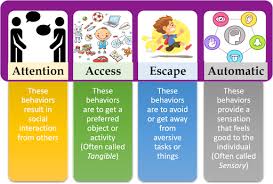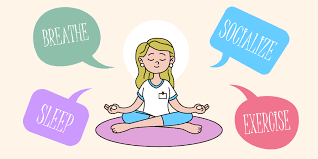The Impact of Behaviors on Our Daily Lives
Behaviors play a crucial role in shaping our daily lives and interactions with the world around us. From the moment we wake up to the time we go to bed, our behaviors influence our thoughts, emotions, and actions.
Positive behaviors, such as practicing gratitude, being kind to others, and maintaining a healthy lifestyle, can lead to improved well-being and overall satisfaction. These behaviors not only benefit ourselves but also contribute to creating a positive environment for those around us.
On the other hand, negative behaviors, such as procrastination, self-doubt, and unhealthy habits, can hinder our progress and impact our mental and physical health. It’s important to recognize these behaviors and work towards replacing them with more positive alternatives.
Changing behaviors is not always easy and may require conscious effort and commitment. By setting clear goals, creating a supportive environment, and seeking help when needed, we can gradually shift towards healthier and more beneficial behaviors.
Self-awareness plays a key role in understanding our behaviors and their effects on our lives. By reflecting on our actions, identifying patterns, and acknowledging areas for improvement, we can take proactive steps towards personal growth and positive change.
Ultimately, by cultivating positive behaviors and making conscious choices in our daily lives, we can create a more fulfilling existence for ourselves and those around us. Let’s strive to be mindful of our behaviors and embrace the power they have in shaping our reality.
7 Essential Behaviors for Building Strong Relationships and Personal Growth
- Practice active listening to show respect and understanding.
- Be mindful of your body language to communicate effectively.
- Show gratitude towards others to foster positive relationships.
- Practice empathy by putting yourself in other people’s shoes.
- Set boundaries to maintain healthy relationships and self-care.
- Practice patience when dealing with challenging situations or individuals.
- Seek feedback from others to continuously improve and grow.
Practice active listening to show respect and understanding.
Practicing active listening is a powerful behavior that demonstrates respect and understanding in our interactions with others. By truly focusing on the speaker, maintaining eye contact, and providing verbal and nonverbal cues to show engagement, we show that we value their perspective and are genuinely interested in what they have to say. Active listening not only fosters better communication but also builds trust and strengthens relationships by creating a sense of validation and empathy. It is a simple yet impactful way to enhance our connections with others and cultivate a more harmonious environment in both personal and professional settings.
Be mindful of your body language to communicate effectively.
Being mindful of your body language is essential for effective communication. Nonverbal cues such as posture, gestures, and facial expressions can convey a wealth of information to others. By paying attention to your body language, you can ensure that your message is being communicated clearly and accurately. Maintaining open and confident body posture can help establish trust and rapport with others, while mirroring the body language of your conversation partner can enhance understanding and connection. Remember, your body language speaks volumes, so be conscious of how you present yourself in order to communicate effectively.
Show gratitude towards others to foster positive relationships.
Showing gratitude towards others is a powerful behavior that can significantly impact the quality of our relationships. When we express appreciation for the kindness, support, or efforts of others, we not only uplift their spirits but also strengthen the bond between us. Gratitude fosters a sense of connection, trust, and mutual respect, creating a positive atmosphere where relationships can thrive. By incorporating this behavior into our daily interactions, we can cultivate deeper connections and contribute to a more harmonious and fulfilling social environment.
Practice empathy by putting yourself in other people’s shoes.
Practicing empathy by putting yourself in other people’s shoes is a powerful tip that can enhance your relationships and interactions with others. By taking the time to understand someone else’s perspective, emotions, and experiences, you can foster deeper connections, build trust, and communicate more effectively. Empathy allows you to see the world through a different lens and respond with compassion and understanding. It promotes kindness, respect, and mutual support in your interactions, ultimately creating a more harmonious and empathetic community.
Set boundaries to maintain healthy relationships and self-care.
Setting boundaries is a crucial aspect of maintaining healthy relationships and practicing self-care. By clearly defining what is acceptable and unacceptable in our interactions with others, we establish respect for ourselves and communicate our needs effectively. Boundaries help us prioritize our well-being and prevent feelings of resentment or burnout. When we respect our own boundaries, we set a positive example for others to follow, fostering healthier and more fulfilling relationships built on mutual understanding and consideration. Remember, setting boundaries is an act of self-love that empowers us to create harmonious connections while honoring our own needs.
Practice patience when dealing with challenging situations or individuals.
When faced with challenging situations or difficult individuals, it is essential to practice patience. Patience allows us to maintain a sense of calm and composure, enabling us to approach the situation with a clear mind and thoughtful responses. By exercising patience, we can better understand the circumstances at hand, empathize with others’ perspectives, and work towards constructive solutions. Embracing patience in challenging moments not only fosters personal growth but also cultivates stronger relationships and fosters a more positive environment for all involved.
Seek feedback from others to continuously improve and grow.
Seeking feedback from others is a valuable practice that can help us continuously improve and grow. By receiving input from different perspectives, we gain valuable insights into our behaviors, actions, and areas for development. Constructive feedback provides us with opportunities to reflect on our strengths and weaknesses, identify blind spots, and make positive changes. Embracing feedback as a tool for growth allows us to enhance our self-awareness, refine our skills, and build stronger relationships with others. Through an open attitude towards feedback, we can foster personal development and strive towards becoming the best version of ourselves.



